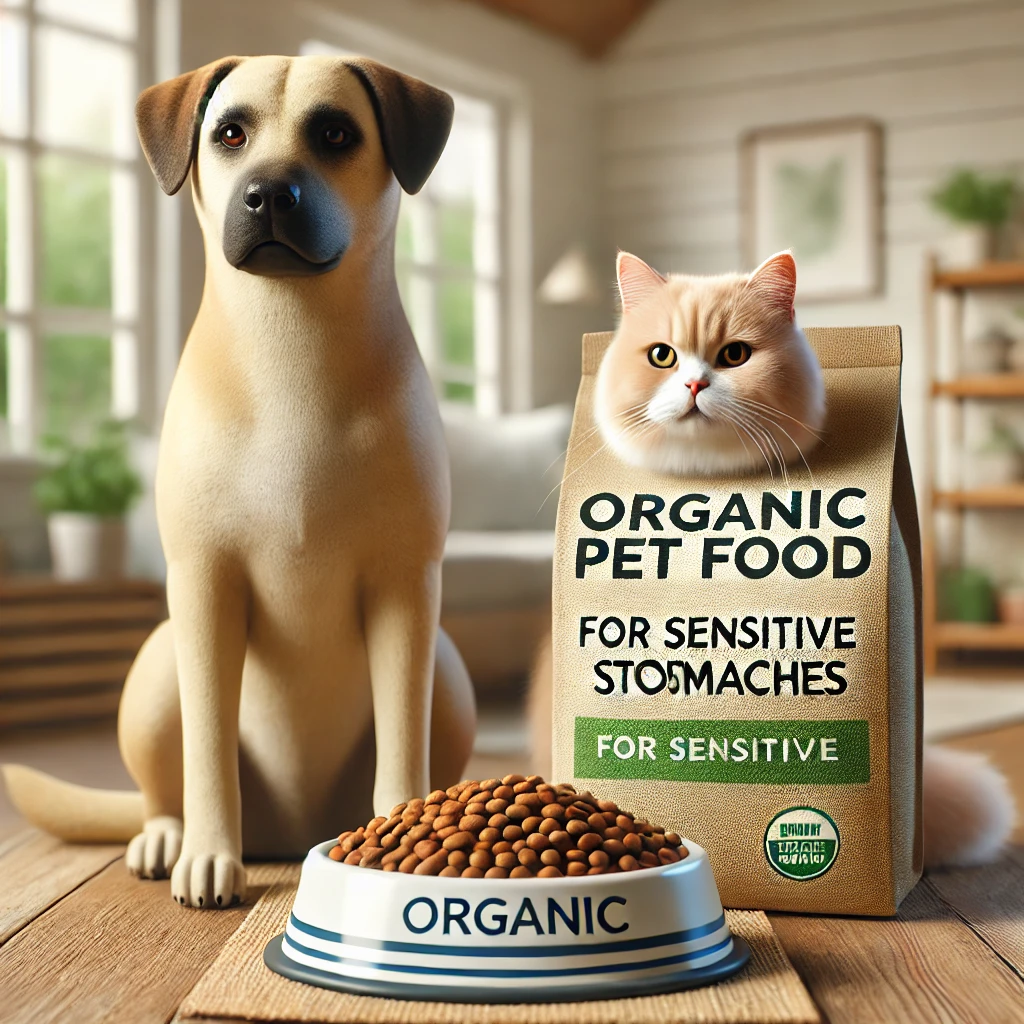Introduction
For pets with sensitive stomachs, finding the right food can make a world of difference. Organic pet food is increasingly popular among pet owners as it offers natural ingredients without harmful additives, providing a gentler option for pets prone to digestive issues. This guide explores the symptoms of digestive sensitivity, the benefits of organic pet food, and offers top brand recommendations to help you make the best choice for your pet’s health.

Common Symptoms and Causes of Sensitive Stomachs in Pets
Pets with sensitive stomachs often exhibit symptoms that can be uncomfortable and affect their quality of life. Recognizing these symptoms is the first step toward helping your pet:
- Vomiting: Frequent vomiting is a common sign of sensitivity, especially after meals.
- Diarrhea: Loose stools or inconsistent bowel movements often point to digestive upset.
- Flatulence: Excessive gas can be a symptom of poor digestion or food intolerance.
- Loss of Appetite: Pets with sensitive stomachs may avoid food, especially if they associate it with discomfort.
The causes of these sensitivities vary, from food intolerances to a lack of balanced gut bacteria. Choosing the right diet, especially an organic one, can help minimize these issues.
Advantages of Organic Pet Food for Pets with Sensitive Stomachs
Organic pet food offers several benefits, particularly for pets with digestive issues. Here’s how organic options can support sensitive stomachs:
- Natural Ingredients: Organic pet foods are free from artificial additives, preservatives, and pesticides, reducing the risk of triggering digestive sensitivities.
- Higher Nutrient Content: Organic pet food tends to have a higher concentration of essential nutrients, aiding in overall health and digestion.
- Limited Ingredient Formulas: Many organic brands use limited ingredients, making it easier to avoid common allergens like corn, wheat, and soy.
- Free from Hormones and Antibiotics: Organic meat sources are raised without hormones or antibiotics, reducing exposure to substances that could upset your pet’s stomach.
In summary, organic pet food provides a clean, digestible option that can improve gastrointestinal health, making it ideal for pets with sensitive stomachs.
How to Choose Organic Pet Food for Sensitive Stomachs
Selecting the right organic food for a pet with a sensitive stomach requires careful attention to ingredients and formulation. Here’s a guide to help you pick wisely:
| Consideration | Description |
|---|---|
| High-Quality Protein Sources | Look for single-source proteins like organic chicken, turkey, or fish to avoid mixed-meat allergies. |
| Avoid Artificial Additives | Ensure the food is free from artificial flavors, colors, and preservatives. |
| Limited Ingredient Formulas | Opt for formulas with fewer ingredients to minimize the risk of allergens and irritants. |
| Digestive Enzymes and Probiotics | Foods enriched with probiotics and digestive enzymes can improve gut health and aid digestion. |
| Organic Certifications | Look for certified organic labels to ensure quality and compliance with organic standards. |
When in doubt, consult your veterinarian to identify any specific needs your pet may have, especially if they’re prone to allergies or food sensitivities.
Recommended Brands and Products for Sensitive Stomachs
Choosing the right brand is crucial when catering to a pet with a sensitive stomach. Here are a few top organic pet food brands that prioritize digestive health and ingredient quality:
- Castor & Pollux Organix: This brand offers a range of certified organic pet foods made with non-GMO ingredients. Their formula includes organic chicken and vegetables, catering to pets with sensitive stomachs by avoiding artificial additives.
- The Honest Kitchen: Known for its dehydrated, limited-ingredient organic pet foods, The Honest Kitchen provides easily digestible meals that are gentle on sensitive stomachs. Their foods are minimally processed and use whole foods.
- Tender & True: This brand offers USDA-certified organic pet food with options for single-protein sources like chicken and turkey. Their recipes avoid artificial preservatives and fillers, supporting gentle digestion.
These brands provide organic pet food options specifically formulated to reduce the risk of digestive upset, ensuring pets with sensitive stomachs receive optimal nutrition.
Transitioning to Organic Food: Tips for Pet Owners
Switching your pet to an organic diet can greatly benefit their digestion, but a gradual transition is key to avoiding gastrointestinal upset. Here are some transition tips:
- Slow Integration: Mix small amounts of the new organic food with your pet’s current food, gradually increasing the amount over 7-10 days.
- Monitor Reactions: Watch for any signs of discomfort, such as vomiting or diarrhea, and adjust the transition pace accordingly.
- Keep Hydration High: Encourage your pet to drink water, which aids digestion and can help reduce the risk of constipation as they adjust to the new food.
By following these steps, you’ll give your pet’s digestive system time to adapt, minimizing potential discomfort during the transition.
Future Outlook: How Organic Pet Food Supports Long-Term Health
As awareness of pet nutrition grows, more pet owners are turning to organic foods to support their pet’s long-term health. Organic diets offer sustainable benefits for pets with sensitive stomachs, including fewer digestive issues, improved nutrient absorption, and enhanced immune function. By choosing organic, pet owners are investing in their pet’s health and well-being, ensuring they enjoy a balanced, comfortable life.
External Resources for Further Reading
- The Facts About Natural Dog Food – American Kennel Club
- akc.org
- Digestive Problems in Pets: Causes, Signs and Treatments – PetMD
- petmd.com
Conclusion
Selecting the right organic pet food for pets with sensitive stomachs can help alleviate digestive discomfort and improve overall well-being. By choosing high-quality, organic brands that prioritize limited ingredients and natural sources, pet owners can provide a balanced, digestible diet that supports sensitive digestion. Transitioning carefully and monitoring your pet’s response to new foods will further enhance their experience, allowing them to enjoy the full benefits of a wholesome, organic diet.

